Communication, Language and Literacy - Birth to 2 years


Your child’s communication, language and literacy skills develop at a fast pace in the early years, especially in the first two years of life. While talking comes a little later, your baby communicates with you through her coos, expressions, gestures, smiles and even cries.
Different cries can mean different things. Your baby could be saying “I am hungry”, “I want to be picked up” or even “My diaper is wet”. She loves being with you and listening to your voice when you engage her in conversations as you change her diaper, feed her, bathe her and during story times.
As your baby grows older, at around 4 to 6 months, she starts to respond to different intonations and can even imitate some of these. Your baby will be babbling and may even repeat sounds.
By around 10 to 12 months, she begins to understand that objects have names and may start saying a few words. You will find that your baby is starting to understand simple sentences and can even follow simple directions.
By the time your child is two, you will notice many changes in the way she communicates, the language she uses and in her literacy behaviours. She will be chattering and communicating her needs, wants and preferences through words. She will sing songs and recite rhymes. Include visits to the library, parks and museums to satiate her curiosity!
WHAT CAN YOU DO? *New*
Play the imitation game! Help your baby link words to objects and actions by playing a simple imitation game! For example, shake a rattle and sing "Shake the rattle, baby, shake it!" Hand her a rattle so she can imitate you as you sing and shake the rattle! Play this game with other routine activities. For instance, at dressing up and bath time, you can say "Brush your hair baby, brush it," as you brush her hair.

Build firm language foundations! Respond and engage positively to your baby's coos and babbles using words, sentences and gestures. Let your baby know his commund and engage positively to your baby's coos and babbles using words, sentences and gestures. Let your baby know his communication means something and this will encourage him to communicate more. For instance, when your baby babbles while you are singing, you can say, "You love it when mummy/daddy sings to you!"
~ Dr Pamela Sharpe, Early Childhood Consultant

Imitate a phone conversation! Using a toy telephone or just your hands as pretend receivers, have a pretend phone conversation with your child! Pretend to call daddy and talk about events of the day. Your child may not be able to join in the phone conversation but you can help her connect words to the day's events!

Encourage your child to imitate your actions through simple games such as "Pat-a-Cake" and "Peek-a-Boo". If your child tries to initiate these games with you, acknowledge his attempts by saying the name of the game and joining in. Have fun!

Acknowledge your child's attempt to communicate with you! Talk about her actions to show that you understand her. You can also introduce new words to her! For example, if your baby is reaching for an apple slice that you are holding, say "Does Rachel want to have another apple slice? Mommy has an apple slice."
.jpg?sfvrsn=be45f2ec_0)
Expand on the simple words that baby makes! For instance, if baby says "dada", expand her vocabulary by sayng "Daddy is coming! Daddy loves you!" If you can anticipate what baby wants, use words to represent her wants, "Baby wants Daddy to give her a hug?"
.jpg?sfvrsn=6be95ffc_0)
Talk about your day! As the day passes, narrate the events to your baby! This helps her to make connections between words and the things she experience. "Now it's bath time! Can you feel the warm water and smell the soap? Look! Bubbles are forming!"

Communicate with your baby! Talk with your infant/ toddler and provide lots of eye contact and facial expressions. Provide cloth and bath books to your child and talk about the pictures. Expose your child to rhymes and songs too, especially finger rhymes. Bear in mind to avoid baby language!
~ Ms N. Pushpavalli, Principal of Ramakrishna Mission Sarada Kindergarten

Books are important! Reading to and with young children is one of the most enjoyable ways to support language development. Books have the vocabulary, visuals for extending ideas and story plots that encourages fantasy, fact, mystery, which are important for the young child in acquiring expressive language.
~ Dr Geraldine Zuzarte, Deputy Director, Professional Practices, SEED Institute, and Centre Director, The Caterpillar's Cove Child Development and Study Centre
.jpg?sfvrsn=ccca8dfa_0)
Help your child model languages. Children need to hear the language that they can model. Talk to your children about things around them; things that interest them and even during meal times. Outings such as a visit to the park or place of interest could also spark ideas for sharing and conversation.
~Dr Geraldine Zuzarte, Deputy Director, Professional Practices, SEED Institute and Centre Director, The Caterpillar's Cove Child Development and Study Centre
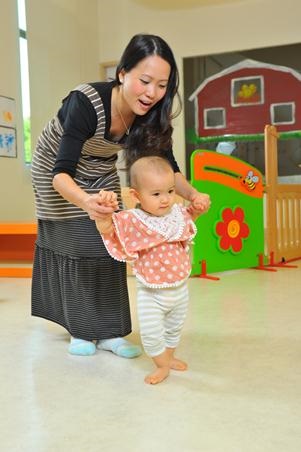
Let's draw. Encourage your child to say something about her drawing. You can use coloured markers to write what she says onto the artwork. Put it up where she can see it. Every now and then, highlight a certain aspect of the drawing. Create a portfolio of your child's drawings for him to flip through anytime.

Enrich your environment. Your child is beginning to understand signs and words. You can create a rich language environment by pasting labels on objects - the door, chair, table, toys, and anything that your child can see at her eye-level - in your house.

Be a good role model. You are your child's favourite teacher. Your child is listening to how you use language. For instance, to describe an activity ("I am going to shower you."), explain to your child ("So you will be clean."), and even to ask questions ("How does the soap feel?").
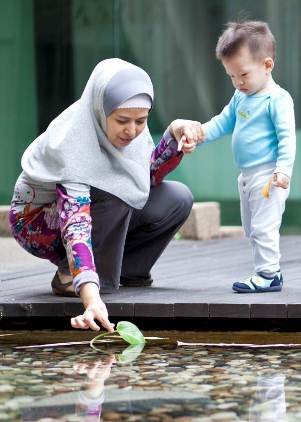
Use specific vocabulary. Expose your child to vocabulary specific to the activity or experience. For instance, during bath-time, you could use words like 'water', 'soapy', 'slippery', 'bubbles', 'sponge' and 'wet'. For mealtimes, include names of the different food served and describe their textures. With your older toddler, talk about good eating habits and table manners.

Talk through daily routines. Adding words to daily routines and events will help develop your child's communication and language skills. More importantly, this will help expand his vocabulary. Your child will begin to understand that words have meanings and convey ideas and feelings.

Read books with repetitive phrases. Your child will enjoy books with repetitive phrases. Books like Let’s Go on a Bear Hunt or Brown Bear, Brown Bear, What Do You See can help your child remember phrases and expand her vocabulary. Eric Carle’s and Rod Campbell’s books are a great way to start!


Verbalise your child's actions and feelings. By doing this, your child begins to attach words to actions and feelings thus expanding her vocabulary. She is also learning that her loved ones will respond to her non-verbal signs and attempts to communicate. When your child realises that her communications are important and effective, she will be motivated to keep developing these skills.

Have face-to-face interactions. Your baby loves looking at your expressions when you talk. Use every chance to engage her face-to-face. Be sensitive to your baby’s cues. Once she starts looking away, switch to another activity as she is telling you enough. Young children have short attention spans. Using eye contact helps her practise prolonged attention. Face-to-face interactions allow your child to observe how we show emotions and communicate.

Provide a variety of books. As your child grows, his interests and preferences will change. Reading with your child introduces him to language and helps him acquire important language skills. Include a variety of books in your read aloud experience together. Consider picture story books, wordless books, concept books, rhyming books, folktales and fables, informational books, etc.
.jpg?sfvrsn=ed074bf9_0)
Create a photo montage. On your next shopping trip or outing with your child, take photographs. The combination of several photographs can be used to talk about and recall different aspects of the experiences. This activity builds your child’s vocabulary as she begins to relate to familiar pictures or scenes and link them to words.

Make a grocery list. Draw up the list with your child. Let him suggest some items for the list. For example, ask him what he would like to buy for breakfast. Let him see how you write the letters. This can help your child increase alphabetical awareness, link words to objects and learn about the meaning of print.
.jpg?sfvrsn=29cd29e5_0)
Ask questions. This will set your child thinking. Even if she does not answer, pause a moment or two before you respond. This is a great way to encourage conversations with your child as you interact with her everyday. Tell her about your day and ask how was hers. She will enjoy having small talks with you.
.jpg?sfvrsn=15c55e35_0)
Keep sentences short. Use brief sentences, but do not be afraid to use lots of different words. The more words your child is exposed to, the better. This will help your child develop early literacy through listening and your interactions with him.

Make Small Talk. Your baby or toddler is listening. Make use of every opportunity you get to talk to her. Point out objects and name them. Speak slowly and use a higher-pitched voice as this helps your child to hear the sounds of the letters better.
.jpg?sfvrsn=67cb9206_0)
Read daily! Set aside a period each day for story-time with your child. You may skip pages or simply focus on a character as your child's attention span may vary from less than a minute to two to three minutes at this age.

Recite and sing rhymes and songs with actions. Be animated and use different voices like high and low pitches to engage your child’s attention. Your playful voice will capture her interest.

Engage in finger play. Rhymes like ‘Incy-wincy Spider” and “10 Little Fingers” have fun and engaging finger play actions which you can do with your baby. If your child is older, she can imitate your actions.

Make routine tasks engaging and stimulating. Have a conversation with your child during caregiving times, such as diaper-changing, showering and feeding. Describe your actions and tell your child what you are doing. For example, you can talk about the textures and colours of the food on her plate.
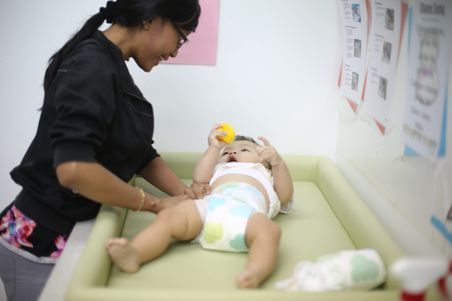
Puppets are interesting. Playing with puppets can help enhance your child’s language development. Use the puppet to recite a rhyme or a chant, and encourage your child to do the same.

Share a book. Talk about the pictures, characters and colours. Ask your toddler about her favourite characters or books.

You may also like
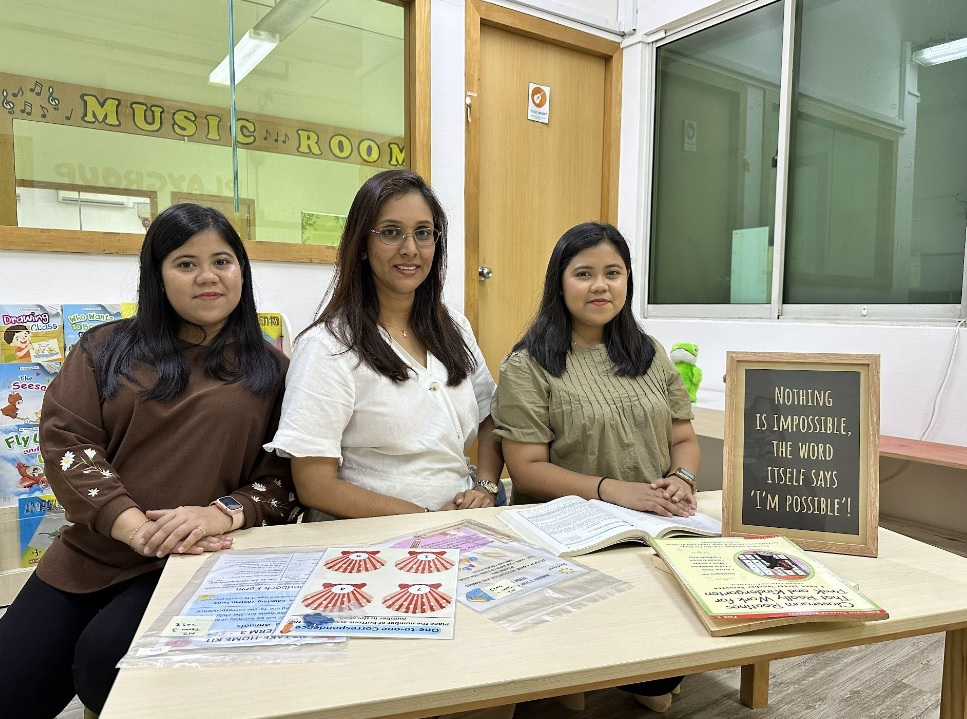
Translating Passion to Profession: Angelene, Nurziana and Sharidah's Voyage in Early Childhood Education
PDP has undoubtedly deepened the skill sets and enriched the expertise of exemplary educators such as (Nur)Ziana and Sharidah

Ms Jegatheswary
Cluster Head at Sunflower Preschool
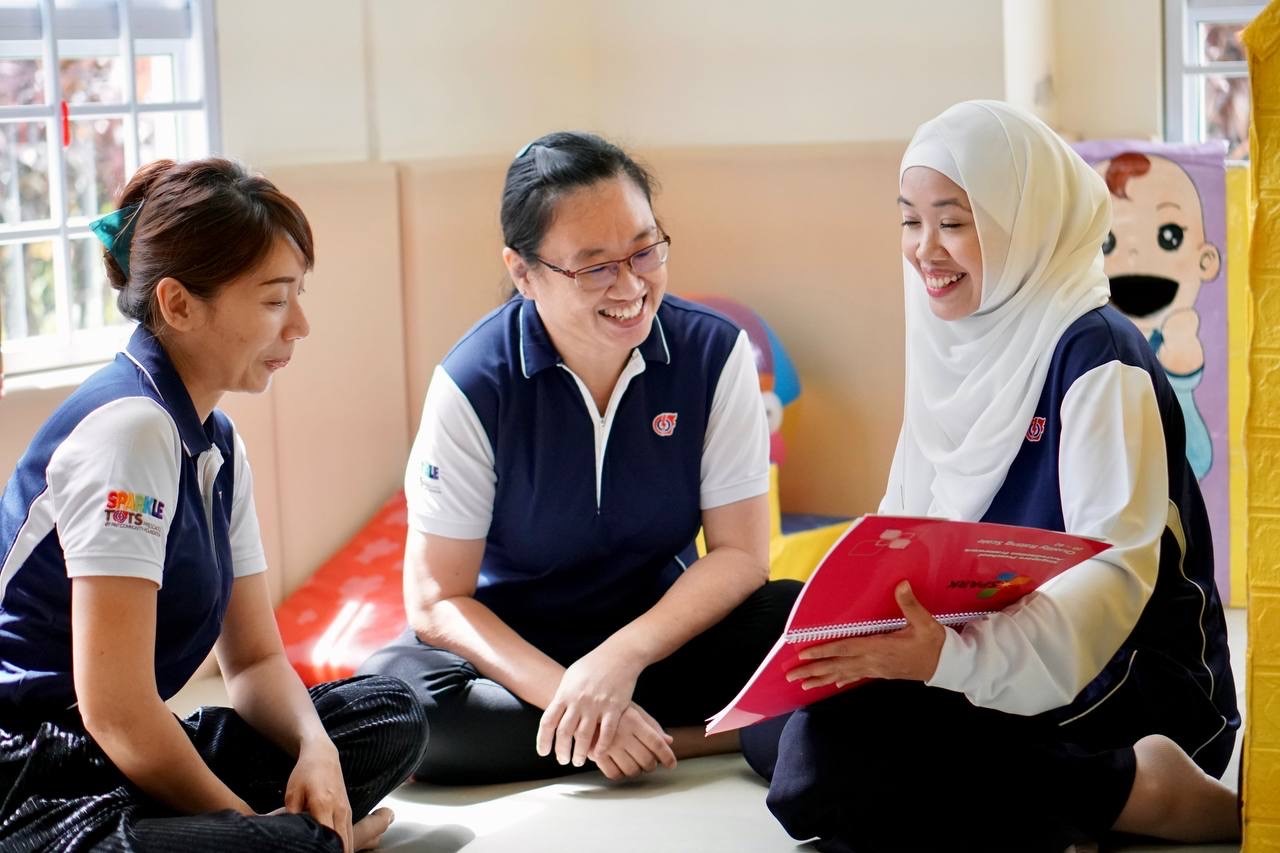
From Cabin to Classroom: Journey of an Outstanding Early Childhood Educator
The PDP modules allowed me to get creative with lesson ideas and keep up with the ever-changing Early Childhood sector.

Ms Farhana Binte Mohamed Hassan
Early Years Educator - PCF Sparkletots @ Pioneer Block 987D (CC)

More Than Just a Place for Food
Young children are highly inquisitive, and learn most effectively with activities that allow exploration and experimentation.

Kinderland @ Yio Chu Kang